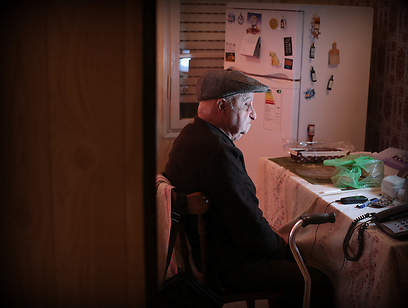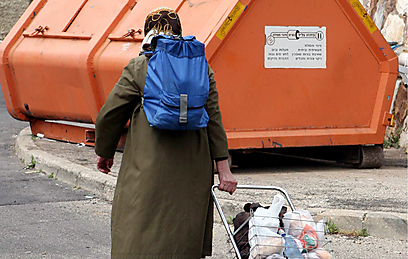
Prices go up, seniors go under
As cost of living continues to rise, new survey says seniors give up necessities to pay utilities. 'Government needs more heart,' one senior says
"I save on electricity and turn on the heating only for a few hours every day. Sometimes it gets very cold but I can't afford more than that, and I have no choice. So I wear a coat and try to take care of myself," said Naftali Salomon, a 80-year-old man living in economic distress.
"Living under these conditions isn't easy," he told Ynet, "but a man has to take care of himself."
Related stories:
- 2013 brings new wave of price hikes
- CBS report: Israeli economy declining
- Interest rate cut amid slowdown fears
Salomon is not alone: Nearly half (44%) of the elderly avoid heating their homes during the cold winter months frequently to very frequently, according to a survey of 400 elderly Israelis conducted by the International Fellowship for Christian and Jews (IFCJ).
The survey was published the same day the prices of various basic products and services were raised. These include water and city taxes, which went up Tuesday, and the price of electricity, which is set to go up in the near future. Other austerity measures are expected to come into being after the elections due to severe cuts in the State budget.
A survey performed by the Geocartography institute indicates that one in every five seniors (21%) has to give up the use of hot water during the week. Nearly a third (28%) reported their financial situation has worsened compared to the previous year.
One in four seniors reported having to give up basic necessities such as food, medicine and social activity in order to pay for electricity in winter. About a third of those surveyed said they needed aid and 60% believe the government is not doing enough for them.
Empty promises
A few months ago Salomon was released from a long hospitalization after a brain aneurysm. He returned to the tiny apartment where he has been living by himself since his wife, Tina, died of cancer three years ago. "Loneliness is a killer," he said. "Do you know what it's like to come home and see only four walls around you? Sometimes I look at her photo and talk to her."
Salomon immigrated to Israel from Romania in 1970, and was employed at the Haifa port.
His National Insurance stipend amounts to NIS 2,800 ($750). "All our pension was wasted on the retirement home where we lived," he said.
When asked how one survives on such meager means, he answered: "You save on food, electricity and medicine. You reduce spending on everything and buy only what you absolutely have to.
"The government needs to have more heart," he added.
'Who can we turn to? No one listens'
A., a 70-year-old man, is subjected to similar conditions. During the day he stays in a care center run by the Yedid association, which aids seniors and pensioners who suffer from financial and social distress. "It's warm, pleasant and I can meet my friends," he said.
The situation at home, he feels, is terrible: "The house is cold. I don't turn on the heating, not to mention the water boiler. I simply can't. Even with the discount I get from the electric company, I can't pay the bills."
He told Ynet of the shrinking stipends: "The National Insurance gives us less, even though prices keep rising. We are now at a stage in which we can't afford to pay the electric bill or go shopping. We are all the victims of the State.
"I think more than twice before I buy anything. If I want to get bread, I only get half a loaf. If I want yogurt, I only buy one cup and share it with my wife. We have nearly stopped buying meat or fish, and if we do, then only on Fridays and very rarely."
Due to the increasing costs of electricity A. and his wife have decided to reduce the number of times they shower each week.
A. said he gets NIS 2,300 ($615) from the National Insurance Insitute and his wife gets a stipend of NIS 1,800 ($480).
"People scrounge for food in dumpsters because they have nothing," he noted. "It's shameful for the State, not for the people in this condition.
"We've been working for 59 years and now that we need some help, they say 'we can't help you.' Everyone in the care center feels the same. At least we have enough food, but there are those around us who don't even have that much. But the State turns a blind eye."
Operation 'Winter Warmth'
The survey was compiled as part of the IFCJ's "Winter Warmth" campaign, which was launched Tuesday. The organization is planning to transfer NIS 500 ($130) to 16,000 senior in need who live in 110 communities.
In addition, the fellowship intends to hand out roughly 11,000 blankets. The overall budget for the campaign is NIS 9.4 million (roughly $2.5 million). The IFCJ said that this year's initiative was organized after it was announced that the price of electricity is to rise by 10%, which means a leap of over 25% in electricity costs in less than two years.
"The citizens of Israel and its leaders should be ashamed given the fact that so many seniors today, in the winter of 2013, have to choose between heating and food and medicine," said Rabbi Yechiel Eckstein, president and founder of the Fellowship. He called on all political parties to promote the issue of aid for the elderly and to raise the stipends immediately after the installment of the next government.
- Receive Ynetnews updates directly to your desktop












